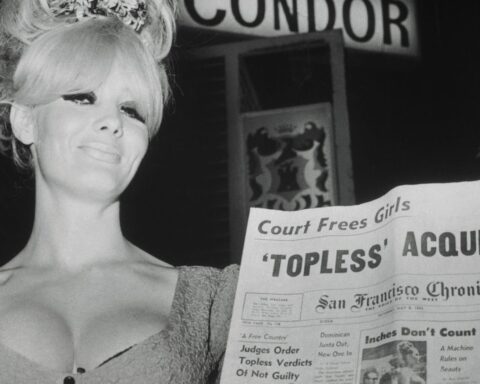Making Time
(USA, 76 min.)
Dir. Liz Unna
There’s a shot that director Liz Unna returns to again and again in Making Time: A sparkling assortment of brass gears, springs, and other miscellaneous bits of watchmaking elements appear scattered chaotically in a pile. The image speaks to both the complexity of the horological pursuits and how the practice can’t be parsed for most mortals. It seemingly suggests that to even begin to understand what goes into watchmaking, one must discern meaning from this pile of disparate bits.
Instead, the metaphor speaks more eloquently to Unna’s earnest yet frustratingly banal film about watch making. The film attempts to deeply dive in the lives of artisans and technicians, but it never successfully invites us in to the subject of their devotion. Save for a few shots that luxuriate over the luxury items being discussed, the vast majority of the film is spent on biographical details that only hint at what keeps this centuries-old skillset still in demand in a world where smartphones put atomic-clock precise timekeeping in every user’s pocket.
Making Time focuses on a handful of characters: the African-American Hollywood actor with a fascination for design, the Swiss maestro who continues old-world techniques and builds million-dollar timepieces once a year, the woman who repairs gaudy yet functional clockwork automata, or the others who through mid-life crisis or otherwise went their independent ways. The title refers to those who make these objects, but we spend far more time on their quotidian concerns through a series of repetitive, sometimes gauzy recreations of earlier events, with almost nothing about those who actually use their creations. It’s a melodramatic mode that focusses on the sacrifices of these individuals, while the actual process of what they do, when it is shown, remains as mysterious and esoteric as that pile of gears.
I fully understand that the tedious process of placing bits upon bits needs some cinematic reinforcement, but the cloying music and slow-motion dolly shots rarely allow the uninitiated into the how of the process, and the harder questions of why seem to boil down to simple obsessions that do little to allow us to truly understand why one would focus one’s life on such pursuits. There’s a global market for such hand-built devices, of course, and we get hints of the massive fashion conglomerates that dominate the field. However, there’s nothing here about how mass production has made such artisanal devices continue to be financially successful, nor how many of these constructions are historically tied to the uber-wealthy. Nothing speaks to how timekeeping itself helped fundamentally reshape global culture in ways both overt and subtle. The film simply hints that the process of taking a long time to make something that tells time is one that remains only for those with enough wealth to spend on something worth owning. It’s like buying a piece of a craftsperson’s life that’s been encased in a form and then strapped to a wrist, or simply placed in a cubby beside dozens of other, equally magnificent specimens.
In other words, accurate timekeeping is about the last thing on the minds of many of these watchmakers. (The automata expert is at least focussed on improving the functionality of her devices.) The same can be said for the watch owners themselves. These are objects of desire, fashion, and fetish. The precision on display is simply a testament to the human effort required to build it. As Unna’s film attempts to communicate, each object is imbued with the stories and struggles of their creators. Put more bluntly, these family traumas and creative challenges feel narrative tools rather than vehicles for creative and engineering insights.
How have the mechanisms of timekeeping changed over the centuries, and when did they get locked into place in order to be considered classic? How does an industry that relies upon these craftspeople and the time it takes to create their coveted works scale to fit consumer demand? What doe failure look like in an industry in which something can take years to develop and yet never catches on? These questions lie about like those watch parts, yet they’re never investigated. Instead, we get shot after shot of waves hitting feet, or a child with his sketchbook and another gazing upwards in a forest, romanticizing the process and the lives of these individual struggles.
The subject itself is worthy of attention, and it serves as a deeper metaphor for holding onto analogue fascinations in our digitally-organized spaces. Anyone’s smartwatch can be themed with myriad faces, but the simulacra of the calibre or movement, a symphony of parts made up of metal, precious elements, and centuries of engineering advancement, cannot be virtualized. Watches hold for many an emotional bond, worn on the wrist as a portable indicator of obscene wealth, appreciation for craft, celebration of tradition, or a combination of all three. Take a look at any celebrity or sportsperson at an event, and look at the hands of their timepieces and how often the date or time is even set correctly. Who should care about intricate mechanisms when the consumers of these products don’t even bother to use them for what’s surely a fundamental aspect of their reason to be?
There’s a film out there to tell this story in a provocative and perhaps even profound way. This is not that film. Instead, in a brisk 75 minutes or so, we meet some interesting people, see some pretty watches, watch as watches are reassembled, and leave knowing almost nothing new about this pursuit save for what we could have guessed going in. Time keeps on ticking, but in the end here we still have that pile of gears, hinting at what could have been constructed out of the disparate parts, but remaining an inert pile of detritus.














